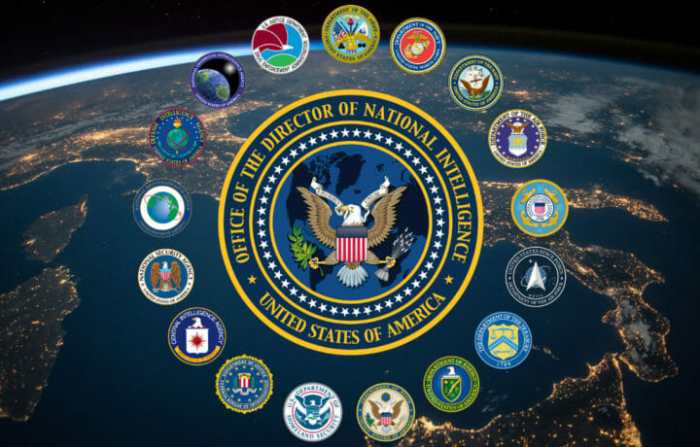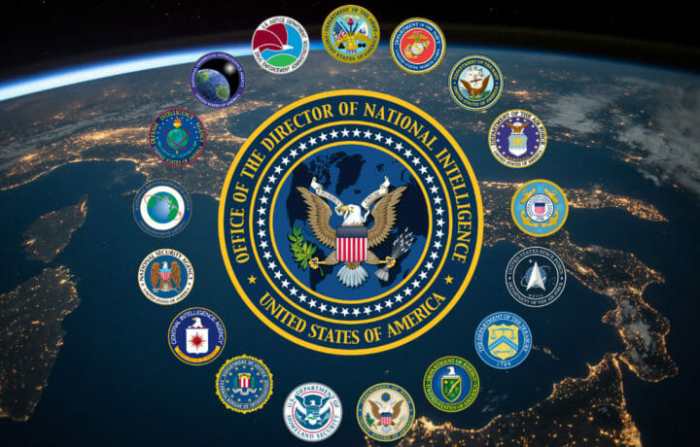
Corporate Takeover of US Intelligence: A Looming Threat?
Corporate takeover of US intelligence is a chilling prospect that has gained increasing traction in recent years. The intertwining of corporate interests with the nation’s security apparatus raises profound questions about the integrity and transparency of our intelligence gathering processes.
This convergence of corporate influence and national security poses a critical challenge to the very fabric of our democracy, demanding a closer examination of the historical evolution, current landscape, and potential ramifications of this concerning trend.
From the early days of Cold War espionage to the digital age of cyber warfare, corporations have played a complex and often controversial role in US intelligence. While private sector expertise and resources can be invaluable in certain areas, the potential for conflicts of interest and the erosion of public trust are serious concerns.
This article delves into the intricacies of this relationship, exploring the ethical dilemmas, democratic implications, and future considerations that must be addressed to safeguard the integrity of US intelligence.
Historical Context
The relationship between corporations and US intelligence agencies has evolved over time, becoming increasingly intertwined in the 20th and 21st centuries. While initially limited to specific instances of collaboration, this partnership has expanded significantly, driven by a confluence of factors, including technological advancements, the rise of globalization, and the evolving nature of national security threats.
The idea of corporations wielding influence over US intelligence agencies is unsettling, especially when you consider the potential for private interests to shape global policy. This raises crucial questions about the role of the United Nations in tackling development issues, like those highlighted on this blog , which are often intertwined with geopolitical agendas.
Ultimately, the corporate takeover of US intelligence could have far-reaching consequences for global stability and the ability of international organizations to effectively address pressing issues.
Early Collaboration and the Cold War
The Cold War era marked a significant shift in the relationship between corporations and US intelligence agencies. The escalating competition between the United States and the Soviet Union fueled a need for enhanced intelligence gathering and covert operations. Corporations, with their technological expertise and global reach, became valuable assets to intelligence agencies.
- IBM, for instance, played a pivotal role in developing and supplying computer systems used by the National Security Agency (NSA) for code-breaking and intelligence analysis.
- AT&Tprovided communication infrastructure and technical support for intelligence operations, including the development of secure communication systems.
- Boeing, along with other aerospace companies, developed advanced reconnaissance aircraft and satellites for intelligence gathering.
These collaborations were often driven by the need for advanced technology and expertise, with corporations receiving contracts and funding from intelligence agencies in exchange for their contributions.
The idea of corporations infiltrating and influencing US intelligence agencies might sound like something out of a spy thriller, but it’s a growing concern. The reality is that corporations wield enormous power, as you can see from these corporate power facts and stats.
This power, combined with the increasing reliance on private contractors for intelligence gathering, raises questions about potential conflicts of interest and the integrity of our national security.
Current Landscape

The influence of corporations on US intelligence activities has become increasingly pronounced in recent years, prompting debates about the implications for national security, privacy, and democratic accountability. This influence extends across various sectors, with corporations playing active roles in intelligence gathering, analysis, and even the execution of operations.
The creeping corporate takeover of US intelligence is a chilling trend, with private entities gaining access to sensitive data and influencing policy. This raises serious questions about accountability and the potential for abuse, especially in light of the growing influence of corporations in international affairs.
The International Criminal Court introduction provides a framework for holding individuals accountable for the most egregious crimes, but it remains unclear how this system will address the increasingly blurred lines between corporate power and state authority.
Key Sectors of Corporate Influence
Corporations exert significant influence on US intelligence activities in various sectors, including:
- Technology: Technology giants like Google, Microsoft, and Amazon provide critical infrastructure and data for intelligence operations. Their cloud computing services, data analytics platforms, and artificial intelligence capabilities are essential for intelligence gathering and analysis. These companies also play a role in developing and deploying surveillance technologies used by intelligence agencies.
- Defense: Defense contractors like Lockheed Martin, Boeing, and Raytheon are major players in the US intelligence community, providing advanced weapons systems, surveillance technologies, and intelligence support services. These companies have deep ties to intelligence agencies, often working closely on projects with classified information.
- Finance: Financial institutions like banks and investment firms have access to vast amounts of financial data that can be valuable for intelligence purposes. Intelligence agencies often rely on these institutions to track financial flows, identify suspicious transactions, and monitor the activities of foreign governments and individuals.
- Telecommunications: Telecommunications companies like AT&T, Verizon, and Comcast play a crucial role in providing communication infrastructure for intelligence operations. They also possess vast amounts of data about their customers’ communications, which can be valuable for intelligence gathering.
Methods of Corporate Influence
Corporations utilize various methods to influence intelligence gathering and analysis, including:
- Data Sharing: Corporations often share data with intelligence agencies, providing them with valuable insights into individual behavior, social networks, and economic activities. This data can be used for intelligence analysis, target identification, and the development of predictive models.
- Technology Development: Corporations develop and deploy technologies that enhance intelligence capabilities. This includes surveillance technologies, data analytics platforms, and artificial intelligence systems that enable intelligence agencies to gather, analyze, and exploit information more effectively.
- Lobbying: Corporations engage in lobbying activities to influence government policies related to intelligence and national security. They advocate for policies that benefit their business interests, such as increased surveillance powers, relaxed export controls, and favorable government contracts.
- Personnel Exchange: Corporations often employ former intelligence officials, who bring their expertise and connections to the private sector. This exchange of personnel creates a revolving door between government and corporate entities, blurring the lines between public and private interests.
Comparison of Corporate Roles in Different Historical Periods, Corporate takeover of us intelligence
The role of corporations in US intelligence has evolved significantly over time. During the Cold War, corporations primarily provided technological support to intelligence agencies. However, the rise of the internet and the digital revolution has dramatically expanded the role of corporations in intelligence activities.
Today, corporations are not only providing technology and data but also actively participating in intelligence gathering and analysis, often blurring the lines between public and private sector activities.
Ethical Concerns: Corporate Takeover Of Us Intelligence
The increasing involvement of corporations in US intelligence activities raises significant ethical concerns. The potential for conflicts of interest and the blurring of lines between private and public sectors create a complex landscape where the pursuit of profit might overshadow national security objectives.
Potential Conflicts of Interest
The integration of private corporations into intelligence gathering presents a considerable risk of conflicts of interest. The pursuit of profit by corporations might clash with the unbiased and objective nature of intelligence collection. For example, a corporation might prioritize intelligence gathering that benefits its own business interests, potentially compromising the integrity of the intelligence collected.
- Prioritizing Commercial Interests:Corporations might prioritize intelligence gathering that benefits their commercial interests, even if it compromises national security objectives. For instance, a corporation might focus on intelligence related to a specific market or industry, neglecting crucial information about national threats.
- Data Privacy and Security:Corporations might handle sensitive data collected for intelligence purposes in ways that compromise privacy and security. For example, they might use this data for commercial purposes or fail to implement adequate security measures, leading to data breaches and compromising national security.
- Lobbying and Influence:Corporations might use their influence to shape intelligence priorities and policies in ways that benefit their own interests. This could lead to biased intelligence assessments and the neglect of critical national security threats.
Examples of Ethical Concerns
Numerous instances highlight the ethical challenges associated with corporate involvement in intelligence.
- Palantir Technologies:Palantir Technologies, a data analytics company, has been involved in various intelligence projects, including supporting the US military in Afghanistan. The company’s involvement has raised concerns about its potential role in civilian casualties and the ethical implications of using its technology for surveillance and targeting.
- Cambridge Analytica:The data analytics firm Cambridge Analytica used Facebook data to target voters in the 2016 US presidential election. This incident raised concerns about the misuse of personal data for political manipulation and the potential for corporate influence on democratic processes.
- The Snowden Revelations:The revelations by Edward Snowden exposed the extent of government surveillance programs, including the involvement of private companies like Verizon and Google. These revelations raised significant concerns about privacy violations and the potential for abuse of power by both governments and corporations.
Future Considerations
The convergence of corporate interests and US intelligence operations is a complex and rapidly evolving landscape. Predicting the future with certainty is impossible, but understanding potential trajectories and developing mitigation strategies is crucial.
Potential Future Developments
- Increased Private Sector Involvement:The reliance on private companies for intelligence gathering, analysis, and technology development will likely increase. This could involve more extensive use of commercial data, artificial intelligence, and cyber capabilities. For example, the US government might increasingly rely on companies like Palantir Technologies for data analysis and predictive modeling in counterterrorism efforts.
- Blurred Lines Between Public and Private:The distinction between government and private sector intelligence activities will become increasingly blurred. Companies may develop capabilities that rival or even surpass those of traditional intelligence agencies. For example, a company like Google could potentially develop advanced surveillance technologies that could be used for both commercial and intelligence purposes.
- Emerging Technologies:The rise of technologies like quantum computing, artificial intelligence, and biometrics will significantly impact intelligence operations. These technologies will offer both opportunities and challenges for both the government and private sector. Companies will likely play a major role in developing and deploying these technologies, potentially giving them a significant advantage in intelligence gathering and analysis.
Framework for Mitigating Risks
A robust framework for mitigating risks associated with corporate influence on intelligence is essential. This framework should address key areas:
- Transparency and Accountability:Clear guidelines and oversight mechanisms should be established to ensure transparency in the relationship between corporations and intelligence agencies. This could include public disclosure of contracts, audits of intelligence activities, and independent oversight bodies. For example, a public watchdog organization could be established to monitor the activities of private companies involved in intelligence gathering.
- Ethical Considerations:Ethical frameworks and guidelines should be developed to address concerns about privacy, civil liberties, and the potential for abuse of intelligence capabilities. These frameworks should be regularly reviewed and updated to reflect technological advancements and changing societal values. For example, ethical guidelines could be developed to ensure that the use of facial recognition technology by private companies does not infringe on individual privacy.
- Data Security and Protection:Robust measures should be implemented to protect sensitive data collected and processed by private companies involved in intelligence activities. These measures should include encryption, access control, and regular security audits. For example, companies handling classified intelligence data could be required to comply with specific security standards and undergo regular independent security audits.
Recommendations for Policymakers
Policymakers should consider the following recommendations to address ethical and democratic concerns related to corporate involvement in US intelligence:
- Establish Clear Ethical Guidelines:Develop and enforce clear ethical guidelines for corporate involvement in intelligence activities, covering issues such as data privacy, surveillance, and the use of advanced technologies.
- Increase Transparency and Oversight:Implement mechanisms for greater transparency and oversight of intelligence activities involving private companies, including public disclosure of contracts, audits of intelligence activities, and independent oversight bodies.
- Strengthen Data Protection Laws:Strengthen data protection laws to ensure the privacy and security of personal data collected and processed by private companies involved in intelligence activities.
- Promote Public Debate and Education:Encourage public debate and education on the implications of corporate involvement in intelligence activities, fostering public awareness and engagement in shaping policy decisions.






